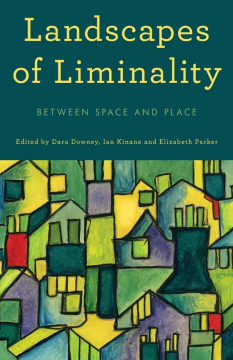
Additional Information
Book Details
Abstract
Landscapes of Liminality expands upon existing notions of spatial practice and spatial theory, and examines more intricately the contingent notion of “liminality” as a space of “in-between-ness” that avoids either essentialism or stasis. It capitalises on the extensive research that has already been undertaken in this area, and elaborates on the increasingly important and interrelated notion of liminality within contemporary discussions of spatial practice and theories of place. Bringing together international scholarship, the book offers a broad range of cross-disciplinary approaches to theories of liminality including literary studies, cultural studies, human geography, social studies, and art and design. The volume offers a timely and fascinating intervention which will help in shaping current debates concerning landscape theory, spatial practice, and discussions of liminality.
The liminal: a threshold, a transitional space, an area between, an edge or fault line. Cutting a path between place and space, the informed and probing essays in this extraordinary volume reach back to Arnold Van Gennep, Victor Turner and Yi fu Tuan in broadly based inquiry showing how edges are critical junctures of and overlapping borders of knowledge that includes folklore, literature, geography, gender, and visual media. Composed and presented with care, Landscapes of Liminality is a valuable contribution to a growing and compelling field of spatial studies.
Tom Conley, Abbott Lawrence Lowell Professor of Visual and Environmental Studies and of Romance Languages and Literatures, Harvard University
Dara Downey is an Associate Lecturer in the School of English, Trinity College Dublin, and a Trinity Access Programme tutor. She is the author of American Women's Ghost Stories in the Gilded Age (Palgrave, 2014), editor of The Irish Journal of Gothic and Horror Studies, and Vice Chair of the Irish Association for American Studies.
Ian Kinane is Lecturer in English Literature at the University of Roehampton, where he teaches popular genre fiction, postcolonial literatures, and children's literature. He is the author of Theorising Literary Islands: The Island Trope in Contemporary Robinsonade Narratives (Rowman & Littlefield, 2016) and editor of Didactics and the Modern Robinsonade: New Paradigms for Young Readers (Liverpool University Press, 2018). Ian is currently writing a monograph in British-Jamaica cultural relations in Ian Fleming's Jamaica-set James Bond novels, and he is the editor of the peer-review, open-access International Journal of James Bond Studies.
Elizabeth Parker is a Teaching Fellow in Contemporary and Popular Literature at the University of Birmingham. She is currently working on her first monograph The Gothic Forest: Deep Dark Woods in the Popular Imagination. She is the TV editor of The Irish Journal of Gothic and Horror Studies and is the co-founder of the upcoming journal Gothic Nature: New Directions in Ecohorror and the EcoGothic.
This collection works a consistent enquiry on a diverse range of ideas of what space/place- and landscape- are. Each keyword is problematic across our disciplines, and here the authors and editors survey this diversity mainly drawn from literature, exploring numerous ‘sites’ always ‘on the edge’ through the idea of liminality, acknowledging that space and place are always uncertain, fluid and vibrant. This interrogation contributes critically to the fluid character of its three key terms, and will contribute to understanding situations of apparently everyday life anywhere.
David Crouch, Emeritus Professor of Cultural Geography, University of Derby
Landscapes of Liminality plots the intersection of the humanities and geographic thought, productively charting a territory in between disciplines. In a set of insightful chapters it explores real and imagined topographies, spatialities and identities, liminal practices, and the spatial poetics of liminality. A useful theoretical and practical guide to liminal geographies.
Rob Kitchin, Professor, National Institute of Regional and Spatial Analysis, National University of Ireland Maynooth
Landscapes of Liminality provides a welcome contribution to the study of in-between states and spaces, with an eclectic group of essays united by their shared allegiance to the classical anthropological conception of liminality developed by Arnold van Gennep and Victor Turner. In this it provides a timely counterpoint to the many recent studies that derive their conceptions of liminality from postcolonial or poststructural conceptual frameworks, without losing sight of their concern with the political potentialities contained within liminal moments, transgressive identities, and heterotopic spaces of all kinds.
Eric Prieto, Professor of French, Department of French and Italian, University of California Santa Barbara, USA
This volume is not only an engaged application of the concept of liminality to issues of space, place and identity. It is much more than that. The volume is comprised of carefully selected chapters that in complementary ways force the reader to think through dominant notions of identity and space through the lens of the in-between, and back again: to deepen our understanding of the liminal dimensions of our times through fascinating case studies of cultural production, identity formation and spatial practice. The book deserves a wide readership across the humanities and social sciences.
Bjørn Thomassen, Associate Professor, Department of Society and Globalisation, Roskilde University
This is a bold and impressive collection of essays which deftly explores the complexity of liminality as a key concept across a range of disciplines. Landscapes of Liminality is a brilliant contribution to on-going debates in the new spatial studies and demonstrates the profound importance of the categories of space, place, and liminal identities to our understanding of culture and society.
Andrew Thacker, Professor of English Literature, Nottingham Trent University
